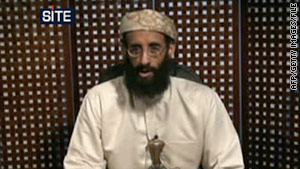Scammer
Banned

-- Radical Muslim cleric Anwar al-Awlaki tried to get information from a British Airways worker for use in a plot to blow up planes, preferably in the United States, prosecutors in London said Tuesday at the start of the trial of the BA employee.
Rajib Karim, 31, exchanged messages with the militant cleric -- who's believed to have close ties with al Qaeda -- in which al-Awlaki asked him for "limitations and cracks in present airport security systems" with an eye to targeting the United States, prosecutors said.
"Our highest priority is the United States," said al-Awlaki, who was born in the United States and is thought to be hiding in Yemen. "Anything there, even on a smaller scale compared to what we may do in the United Kingdom, would be our choice."
Karim, who was arrested in February last year, admits offering himself for terrorist operations, making a jihadi recruitment video and fund-raising for terrorism, but denies knowing that information he gave al-Awlaki would be used for terrorism.
Prosecutors said he passed on information that would have been useful for terrorists plotting to blow up a plane and also facts that could have been used to help plan a "disruptive" cyberattack on British Airways.
They described him Tuesday as "entirely committed to an extreme jihadist and religious cause."
Karim sat confidently in court, largely impassive, wearing a white T-shirt, gray-green V-neck sweater and a winter jacket. His hair was short and his beard was neatly trimmed.
The court heard that Karim, his wife, and baby son came to Britain in 2006, settling in Newcastle in the northeast of England; shortly afterwards, he was accepted into a graduate entrant program at British Airways, eventually ending up as a BA software engineer. The prosecution claims Karim sought out this employment with the express intention of exploiting it for terrorist activities.
He exchanged messages with al-Awlaki in late 2009 and early 2010, after his brother, Tehzeeb Karim, had travelled to Yemen and met with the radical preacher, prosecutor Jonathan Laidlaw told the jury.
When the defendant told al-Awlaki he worked for British Airways, al-Awlaki told him:
"You might be able to provide us with critical and urgent information and you may be able to play a crucial role ... I pray that Allah may grant us a breakthrough through you."
The court also heard that Karim -- who was born in Bangladesh and is now a British citizen -- was 'highly skilled in conducting secret communication, including the deployment of codes and encryption techniques. He also "bided his time," the prosecution said: He quite deliberately set about establishing a lifestyle (in Newcastle) that would not attract attention; he was an observant Muslim but did not associate with known radicals, nor was he known to hold radical views himself, the court heard.
He is also accused of offering to take advantage of a strike last year by British Airways cabin crews. Prosecutors believe he advised his contacts that because of the industrial disputes, he might have the opportunity to apply to join a cabin crew, giving him information on cabin crew training and on-the-job activity.
